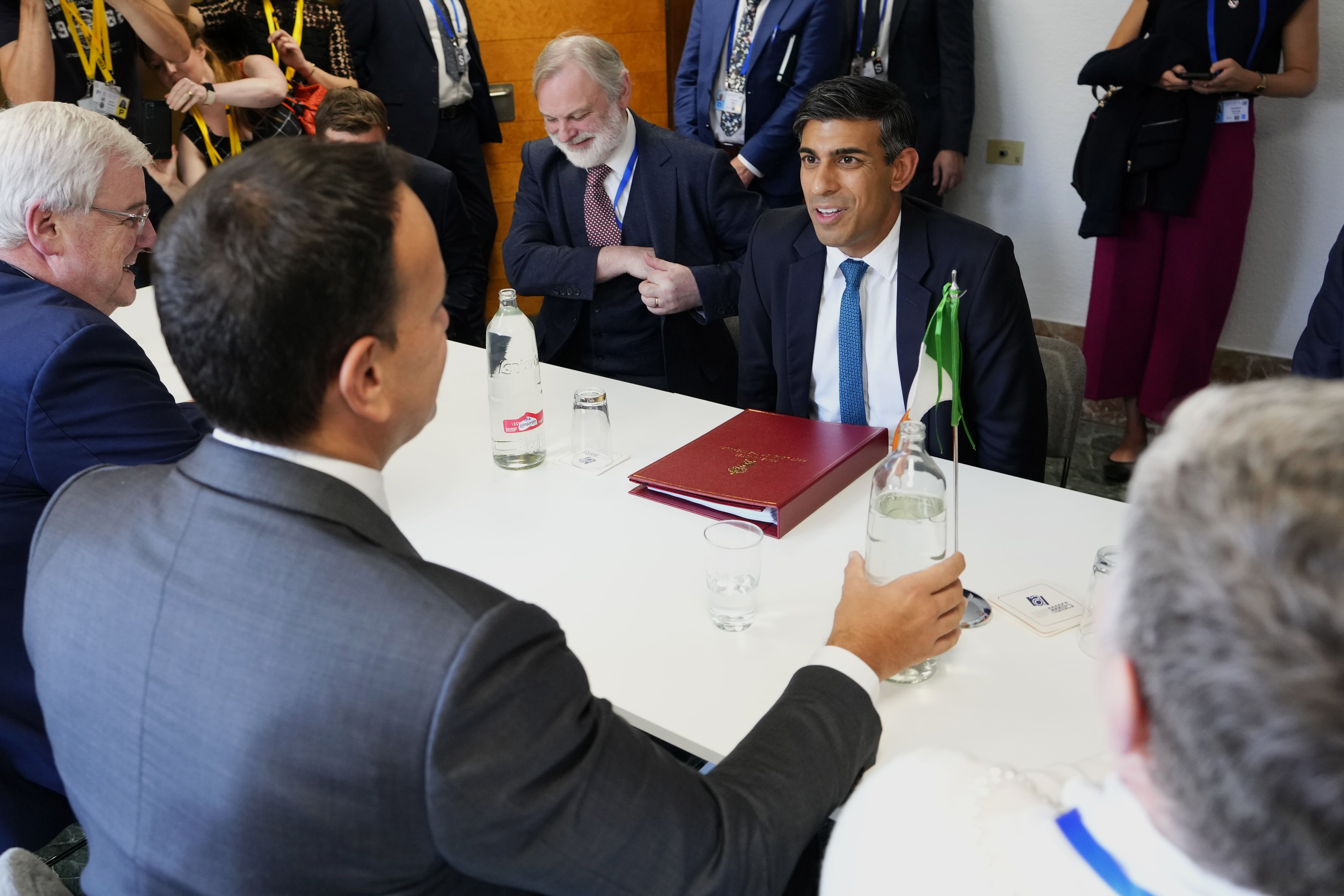Sunak confronts Varadkar over Ireland’s decision to challenge UK’s Troubles law
The PM expressed his ‘disappointment at the timing and course of action’ from Dublin in contesting the Legacy Act in the courts, No 10 said.

Your support helps us to tell the story
From reproductive rights to climate change to Big Tech, The Independent is on the ground when the story is developing. Whether it's investigating the financials of Elon Musk's pro-Trump PAC or producing our latest documentary, 'The A Word', which shines a light on the American women fighting for reproductive rights, we know how important it is to parse out the facts from the messaging.
At such a critical moment in US history, we need reporters on the ground. Your donation allows us to keep sending journalists to speak to both sides of the story.
The Independent is trusted by Americans across the entire political spectrum. And unlike many other quality news outlets, we choose not to lock Americans out of our reporting and analysis with paywalls. We believe quality journalism should be available to everyone, paid for by those who can afford it.
Your support makes all the difference.Rishi Sunak used a call with the Irish premier to confront his counterpart about the UK’s “disappointment” over Ireland’s decision to legally challenge the UK’s response to the Troubles.
Laws enacted by the UK Government strive to provide a limited form of immunity to those accused of Troubles-related offences.
The move has faced staunch criticism and is opposed by many victims’ groups in Northern Ireland and all the main Stormont parties.
The Prime Minister, in a conversation with Taoiseach Leo Varadkar, confronted Dublin over its own response to pursuing those responsible for sectarian violence that marred Ireland and Northern Ireland for decades.
The call between the pair came after Mr Varadkar announced in December that his administration would legally challenge the UK Government over the Legacy Act in the European Court of Human Rights.
He said at the time that the “strong” legal advice was the UK Legacy Act breached the United Nations’ Convention on Human Rights.
The Prime Minister expressed his disappointment at the timing and course of action in December, coming at such a sensitive time
Downing Street confirmed Mr Sunak raised the legal action during his conversation with Mr Varadkar.
A No 10 spokesman said: “The leaders addressed the Irish Government’s launching of an interstate case on the UK Government’s Legacy Act.
“The Prime Minister expressed his disappointment at the timing and course of action in December, coming at such a sensitive time.
“He noted that the Irish Government had yet to respond to important questions about its own approach to legacy issues, including with regard to investigations into the 1998 Omagh bombing.
“The UK Government would continue to pursue answers to those questions which had been laid out by the Secretary of State (Chris Heaton-Harris), including with regard to the lack of criminal prosecutions in Ireland.”
A spokeswoman for the Prime Minister denied the conversation had been terse.
She said the Conservative Party leader had been “reiterating the Government’s disappointment” that had previously been set out by Mr Heaton-Harris, the Northern Ireland Secretary.
Irish Foreign Affairs Minister Micheal Martin said the Irish State would have preferred not to have taken the case, but it wanted to stand by the victims of Northern Ireland’s Troubles.
He also accused the British Government of taking a “unilateral route” to the Legacy Act.
“We would have preferred not to be in a position to take the case of the European Court of Human Rights,” Mr Martin said.
“The question of the Legacy Act’s compliance with European Convention Human Rights is now before the court.
“I’ve been in Northern Ireland on many occasions, and I’ve met with survivors and families of victims of the Troubles and of the terrible events that happened, and we felt the need to stand by the victims, and they were almost unanimous in resisting the Legacy Act, as indeed were all the political parties in Northern Ireland.
“I think that the UK Government took a particular unilateral route to the Legacy Act.
“We didn’t want to find ourselves in this position, reluctantly we did. We were hoping that we could work through the Stormont House Agreement, which everybody had agreed to.
“But, look, it’s before the court now.”
Mr Heaton-Harris wrote to Mr Martin earlier this month, questioning Ireland’s opposition to the Legacy Act.
Aspects of the recently passed UK law include a limited form of immunity from prosecution for Troubles-related offences for those who co-operate with the new Independent Commission for Reconciliation and Information Recovery (ICRIR).
The Northern Ireland Troubles (Legacy and Reconciliation) Act 2023 will also halt future civil cases and legacy inquests.
In his letter to Mr Martin, the Northern Ireland Secretary challenged Ireland to set out its own record on tackling legacy issues, pointing out that, while the UK has initiated a public inquiry into the 1998 Omagh bomb, the Irish Government has not, despite a court ruling saying it should do likewise.
Mr Heaton-Harris also called on Mr Martin to list the number of prosecutions mounted in the Irish State since 1998 related to Troubles incidents.
The phone call with Mr Sunak and Mr Varadkar came after there was a breakthrough in the DUP’s two-year boycott of powersharing arrangements at Stormont.
Mr Sunak briefed his Irish counterpart on the details of the deal that could see devolved government restored in Northern Ireland.
Asked whether the call had been difficult, Mr Sunak’s spokeswoman said: “No, it was a good call, positive.
“They both welcomed the step that we saw from the DUP last night.”
A spokesman for the Irish Government said: “It was a positive call focused on welcoming the good news from Belfast.
“It’s common knowledge that the two Governments have different approaches on legacy issues.
“But we also agreed that it’s important that we continue to work together on other areas.”